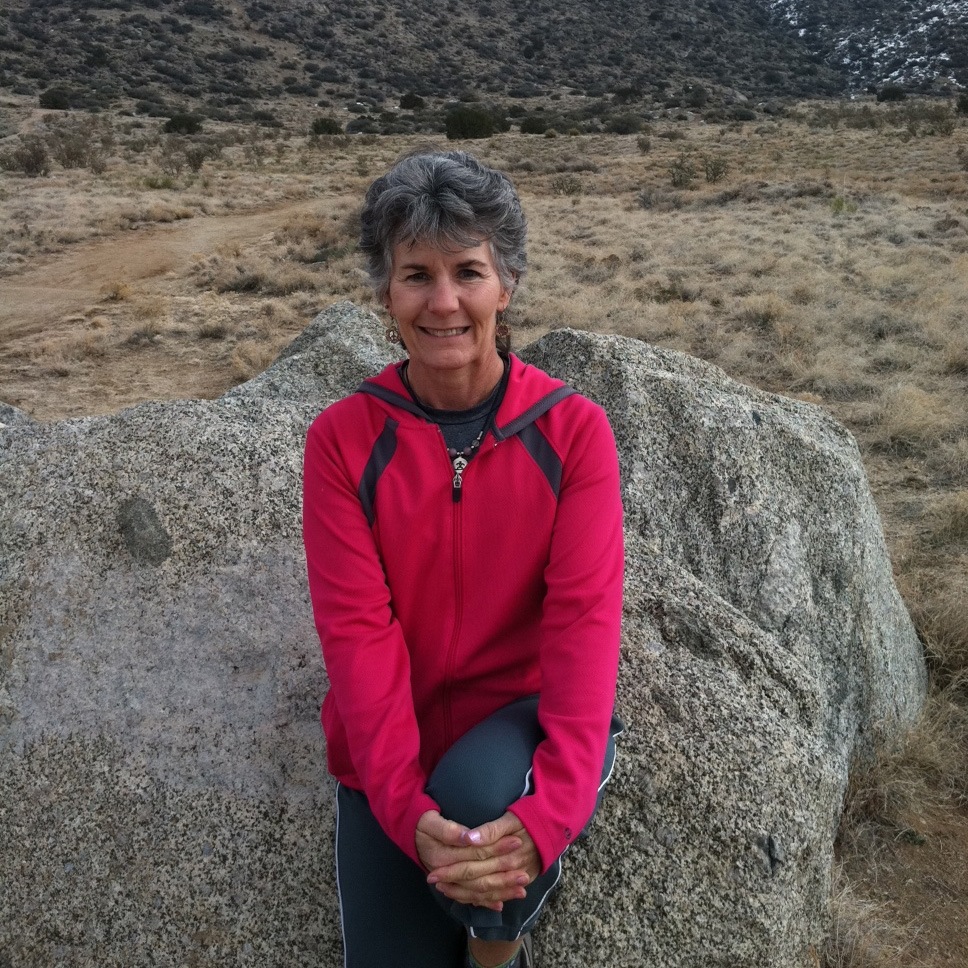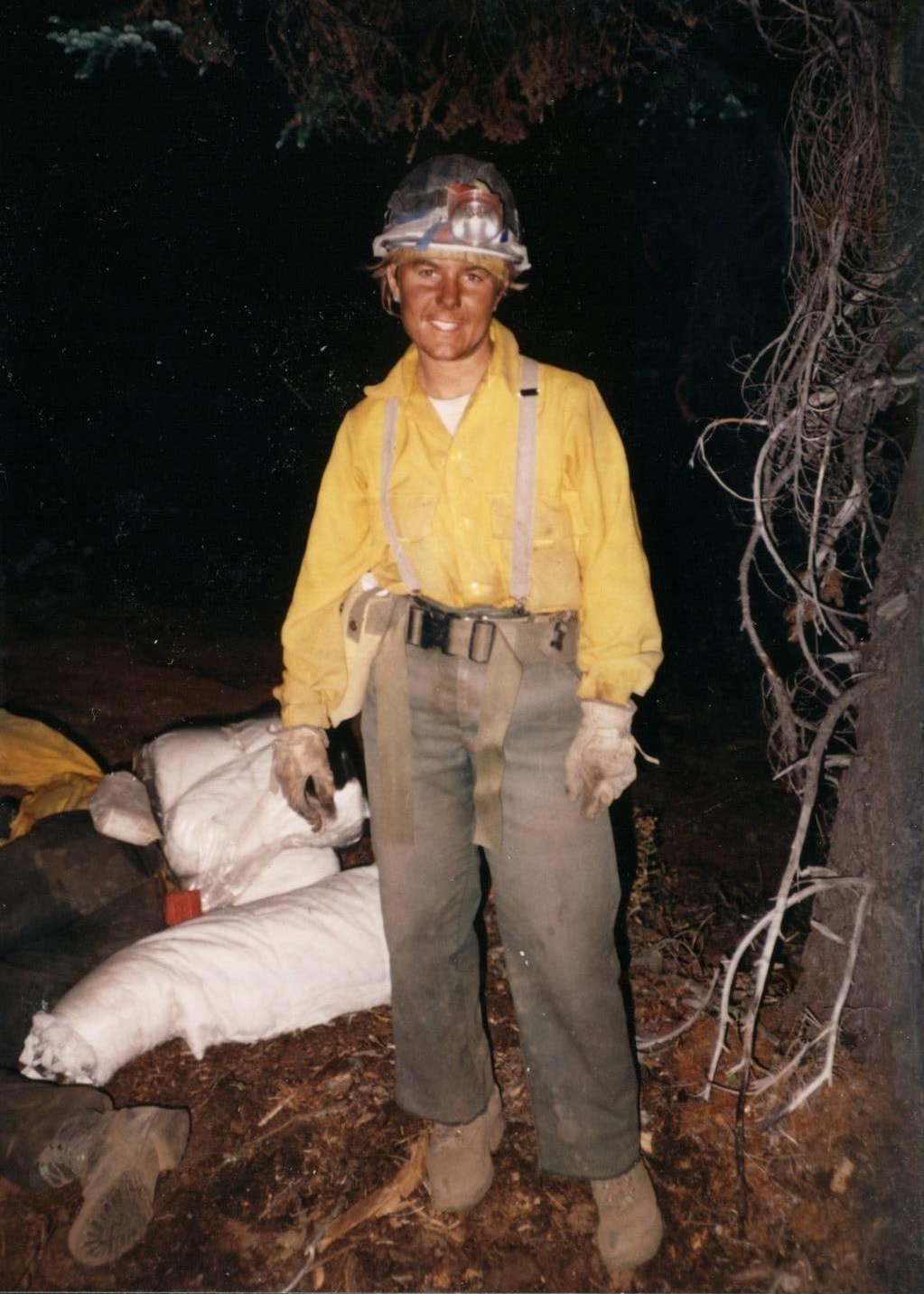Through our Keepers of the Outdoors series, we’ll introduce you to people who protect and care for our wild places.
Bequi Livingston is an old-school badass. She spent her career fighting fires alongside the most respected crews in the West. Today, she’s dedicated to training more women in backcountry firefighting.
She began working with the U.S. Forest Service in 1979 in New Mexico’s Smokey Bear Ranger District. After serving on the Young Adult Conservation Corps, she became a seasonal firefighter, eventually working her way up through fire engines, helitack crews, hotshot crews, fire prevention and fire lookout. Livingston went on to become an assistant fire management officer and later, a prescribed fire operations specialist. She was one of the first women to ever serve on the Sandia Helitack crew, and one of the first two women to ever serve on the prestigious Smokey Bear Hotshot Crew. In 2008, Livingston earned the Paul Gleason Award for her service in the wildland firefighting community.

Photo Courtesy: Bequi Livingston
After retiring, she started the Women In Wildland Fire Boot Camp in 2004, a program still running today in the USFS Southwestern Region (and modeled by other agencies throughout the West) to recruit and train women for success as backcountry firefighters.
She lives in Albuquerque with her husband, competes with the New Mexico Track Club and recently qualified for the National Senior Olympic Games.
Did you dream of being a backcountry firefighter when you were a little girl?
I was lucky to spend all my childhood summers at a remote family cabin in New Mexico where I learned to love nature and the woods. I loved to hike and fish and just spend time in nature. I was also an elite athlete and loved outdoor physical activities. When I was a senior in high school (in El Paso, Texas), I knew that I wanted to be a firefighter but only knew about the city structural firefighters and didn’t even know that wildland firefighters existed.
The vice principal at school would do everything to talk me out of it, saying you are too small, you’re a woman in a men’s profession and it’s too dangerous. He even lent me library books about catastrophic firefighting events. It only fueled my interest more. Then I went to college on an athletic scholarship, and my boyfriend worked as a wildland firefighter for the U.S. Forest Service. That’s the first I even knew about the job. That really sparked my interest because he loved it so much.
What is the job actually like? Can you describe a typical day (if such a thing exists)?

Photo Courtesy: Bequi Livingston
Although wildland firefighting has changed a lot, one typical day on a large fire with a crew would be like this: Wake up about 4am to get dressed and eat chow before attending briefing for the day’s assignment. Depending on the assignment that day for your crew, you will be transported (bus, van, helicopter or walking) to your division with specific instructions for your crew’s 12-hour shift. Duties vary according to the fire’s progression and objectives and, of course, safety. You are typically working with a variety of other fire crews and resources which are very specific and tactical in nature. Most often, you will take a short lunch break at some point and continue working, depending on the current situation as it continually changes. If all goes well during the work shift, you will typically leave the fireline in order to complete your shift by 6pm. Then, you head back to fire camp, eat dinner, shower if showers are available, have a little down time and bed down in your crew tents. But it all depends, and it can all change in the blink of an eye.
What’s it like being a woman in this male-dominated field?
Of course, there are many more women in wildland fire today than when I initially started in 1979. I was a tomboy, and I loved working with men and never expected to be treated any different than anyone else. I rarely had rough times probably because I was able to work very hard, I was physically fit and loved being part of a crew. I never even thought about it being a male-dominated field. When I applied for any jobs, I wanted to be hired for the job based on my qualifications alone, not because I was female. It is a challenging job, sure, but mainly due to the physical demands. In work like this, everyone has to have everyone else’s back. Male or female, doesn’t matter.
Who were your role models or mentors?
My first mentor was my father who always told me that it didn’t matter that I was a very petite women: I could do whatever I put my mind to doing and dream big. He exposed me to a lot of things like hiking, fishing, hunting and an appreciation for working hard, loving what you do and not giving up. Then, my childhood boyfriend Larry Nicky (retired fire management officer from the National Park Service) worked as a seasonal wildland firefighter and loved the job, and I found it to be very exciting. Another mentor is my husband, Ron, who I actually met on a fire in 1988 while I was on the Smokey Bear Hotshot Crew. He was a helicopter pilot. He is also a Vietnam veteran, and he always encouraged me, even though wildland firefighting is a very tough job for marriages.
How does it feel to be a mentor now for other women interested in firefighting careers?
Great! I was provided great opportunities and mentors during my career and wanted to pay it forward. This started with my development of a Fireline Fitness program, which was developed to help all wildland firefighters learn how to be healthy and fit for wildland fire, with an emphasis on women because the physical rigors of the job are pretty tough. I also developed the Fireline Fitness program as a core curriculum where it is taught in the wildland fire science program at Central New Mexico Community College.
The Women In Wildland Fire Boot Camp includes a mentorship component for each student. This prompted similar programs in Utah and California and has been very successful.
I’ve broken many barriers, especially being 4’10” and weighing 95 lbs. I was always able to excel in my career because I loved the job, didn’t expect to be treated any differently and was in excellent physical shape. I could always carry my own weight. If I can do the “Arduous Pack Test,” (walking for 3 miles carrying 45 pounds of weight in 45 minutes or less) then it gives hope to others. I had to train really hard, but I feel strongly about being in the absolute best physical shape that you can to do the job safely. Your life and the lives of others depend on it.
What’s the memorable day in your firefighting career?
The most meaningful story I have about my job is the day I met my husband while fighting a wildland fire in Colorado in July 1988. I was on the Smokey Bear Hotshot Crew, and our crew was “spiked out” (camped out) on a remote ridge while my eventual husband was providing helicopter support to our division. Due to my previous helicopter experience, I was assigned duties of Helispot Manager and responsible for the helicopter operations in our area. We just clicked, and we married a year later.
How do you feel about a firefighter’s role in protecting wild spaces?
Our wild spaces are sacred, and we have some responsibility in protecting them. I also believe in allowing Mother Nature to do her thing and to allow the environment to burn, as is necessary for natural purposes, when it’s not endangering habitat, including human habitat. Unfortunately, with the wildland urban interface and urban encroachment in our wildlands, it puts a whole other spin on things and can put firefighters at risk to protect the urban environment.
What is it you love about the wilderness?
Working outside was the thing, other than physical challenge, that really intrigued me about the job. I loved seeing so much beautiful country and landscapes and felt so blessed to be in places that most people never have an opportunity to experience. There is nothing better than working hard and sleeping under the starts, feeling the breeze on your face, seeing the creatures and knowing that you are doing something special to protect our natural environment.


